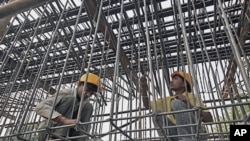The rebound in India's economy in 2010 brought good news for the nation's middle class, which had experienced a boom prior to the global financial crisis. The world's second fastest-growing economy was also lauded by a stream of world leaders who visited India.
When 28-year-old Ankit Gupta reserved an apartment in a housing complex under construction in Gurgaon, close to New Delhi, last year, he was concerned the project might be delayed. Property prices had plummeted, and many cash-strapped developers had put building projects on hold as the global financial crisis slowed down India's booming economy. But Gupta says his worries are over.
"Things have changed for good now," Gupta said. "I just visited the site like two weeks back, and they have started the construction, its going on full-fledged. And even the market has recovered. Even if I tried selling my property, I am getting good return."
It is not just property prices that have risen as the economy has returned to the more than eight per cent growth rate seen in the years before the financial crisis.
Companies are hiring again. Shoppers are crowding malls, and luxury merchandise are entering the country. For the 300 million middle class who are fueling the country's economic growth, the global recession is a faded memory.
It is access to this robust economy that world leaders were considering when they visited India this year. British Prime Minister David Cameron, who came to New Delhi in July, was followed by U.S. President Barack Obama, French President Nicolas Sarkozy, Chinese Premier Wen Jiabao and Russian President Dmitry Medvedev in the last two months.
Officials point out that it was the first time that all five permanent members of the United Nations Security Council visited India in a space of six months. Among the top items on their agenda was closer trade and business ties with the country's fast-growing economy.
Economist D.H. Pai Panandiker, who heads the research group RPG Goneka Foundation in New Delhi, says Western leaders see in India the potential for exports and investment, and the prospect of creating more jobs at home.
"The Indian economy is now over a trillion dollar economy, and it is developing pretty fast," Panandiker said. "That means a very big market for many of these countries where the growth rate is very small. They are looking at India as a market which can give a fillip to their own economy."
Multi-billion dollar deals were announced during the visits, mostly in the infrastructure and defense sectors, where India is making huge investments. Deals worth $10 billion were sealed during U.S. President Barack Obama's visit. During the French President's visit, deals worth about $13 billion were announced, while the Chinese Premier secured deals totaling $20 billion. A $30 billion deal for fighter aircraft was the highlight of the Russian President's visit. All countries set ambitious new targets for increasing trade with India amid forecasts that the high rate of growth will continue.
India is the world's second fastest growing major economy after China. By 2030, India is projected to have the world's third largest gross domestic product after the United States and China.









